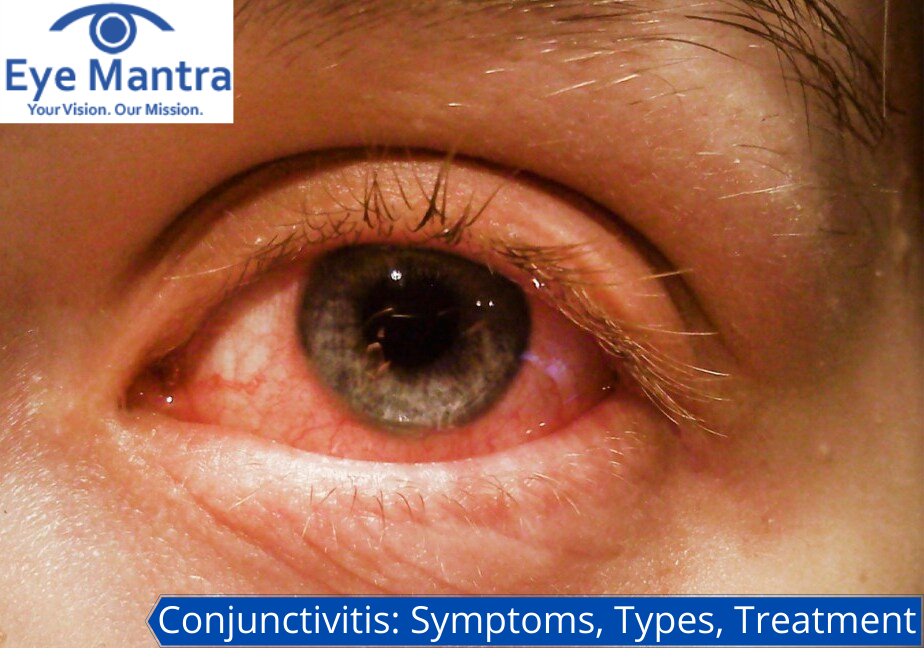Contents
What Is Conjunctivitis?
Conjunctivitis is commonly referred to as “pink eye” or “red-eye”. Common symptoms include problems like itching, burning in the eyes, pain, or headache. People with conjunctivitis generally have swollen eyes and redness all over the thin membrane over the eyeball known as the conjunctiva. The inflammation can also lead to crusty eyes or a water/ pus-like discharge and can sometimes be painful. People might even get viral infections along with cold and cough, mild or severe fever.
It is easily spread among people or from one eye to the other. Therefore, it is often advised not to touch your eyes with your hands as the dirt present in your hand might get unintentionally transferred to your eyes which can cause more problems to your eyes and the bacteria present in the eyes enters your hand which spreads it to different people around you. One must be very careful about all these things and wash their hands immediately if they touch their eyes by mistake. There are several kinds of conjunctivitis each with different ways to be treated.
Different Types of Conjunctivitis?
Viral Conjunctivitis
Viral conjunctivitis might lead to mild fever, cold, or cough. These kinds of conjunctivitis are easily spread amongst people via droplets, that is, if someone around you sneezes or coughs and your eyes end up getting exposed to the droplets. Viral conjunctivitis are self-limited and therefore rather than stressing about them you should simply let the virus run it’s course.
Viral conjunctivitis has no treatment as since it’s a virus however you can apply warm compresses in order to reduce the swelling and are often suggested to not use other oitments, solutions. However, it is quite likely that if not looked after carefully it can spread from one eye to another quite quickly and will only increase the course of illness.
In severe cases of viral conjunctivitis the patient might develop photophobia, foreign body sensation due to membrane inflammation. Chemosis may be present. Even after the conjunctivitis has resolved subepithelial corneal opacities might persist for a period.
Bacterial Conjunctivitis
Bacterial conjunctivitis although usually acute and is not associated largely with morbidity it is however a social menace and is a large cause of concern for missed school and office days. Major causes of bacterial conjunctivitis (acute) are Staphylococcus aureus, Streptococcus pneumoniae and Hemophilus influenzae.
The major problem caused in this is the discharge of pus from the eyes. People are recommended to consult a doctor and get the necessary treatment for it. Generally, some antibiotic eye drops or ointments are prescribed depending upon various kinds of problems faced by the people. The most common ways the bacterial pink eye happens is by: Sharing personal items with others, Touching the eye with dirty hands, Using unclean or old makeup, or leaving it overnight.
With the use of antibiotic medication, your symptoms will disappear within a few days. The most common ways the bacterial pink eye happens is by:
- Sharing personal hygiene or other items
- Touching the eye with dirty hands
- Using unclean or old makeup and makeup brushes
Allergic Conjunctivitis
Allergic conjunctivitis is caused due to different allergens like pollen, hay dust etc. For people with allergies, this certain eye inflammation usually occurs during a certain time of the year. Most likely summer or fall. However, people with perennial conjunctivitis are susceptible to this all time of the year.
Major symptoms of allergic conjunctivitis are itching, burning, and irritation in the eyes. People might feel there is something present in the eye every time; like some dust particles or sand. The positive thing about allergic conjunctivitis is that it does not spread from one person to the other and is not much severe.
Chemically Caused Conjunctivitis
Chemical conjunctivitis is caused due to a flush of toxins which the eye is exposed to like chlorine swimming pools or direct contact to noxious chemicals it can sometimes have dangerous side effects. Accidental chemical exposures like alkali burns from a lab experiment can lead to long term damage to the eye as well. In such dire circumstances immediately flush your eye with fresh water for several minutes and then seek medical care right after.
One of the most common ways to treat chemical conjunctivitis is with saline solution or with topical steroids. Lens wearers might need to suspend the practice indefinitely (until recovery). Since most of these cases occur at work and might lead to medical emergencies it is important to wear protective gear while handling chemicals or even while swimming in public swimming pools.
Symptoms of Conjunctivitis
- Redness all over the white part in the eye which generally causes itching and burning all over the eye.
- Swollen eyes or eyelids and commonly occur with bacterial or viral conjunctivitis.
- Increased discharge of water or pus from the eye.
- Itching or burning in the eyes is common for all kinds of conjunctivitis.
- Pus or some yellow fluids are discharged from the eyes causing intense pain or stickiness between the eyelids.
- People might face problems when exposed to light and they also experience blurred visions. They may also have headaches whenever they come in contact with the light and feel dizziness.
- People always feel that something is there in their eyes, generally, kids explain their problems this way and they have this urge to rub their eyes.
Treatment of Conjunctivitis
Home Remedies For Pink Eye
- Stop using your contact lenses if you are using one as it might be damaged or improper that can cause more problems to your eyes.
- Use a new pair of contact lenses after being treated. Start wearing them only after consulting your doctor.
- Stop wearing any kind of eye makeup while you have an infection as it is very harmful for the eyes.
- Do not apply old makeup as it causes pinkeye.
- Use a fresh towel every day to maintain hygiene.
- Wash your hands often, especially after you touch your eyes to avoid spreading the infection.
- Do not share anything that comes in contact with your eyes with other people as this infection is communicable.
- Put a cool, damp washcloth over your eyes for a few minutes, it controls the burns and itching for some period of time and keeps the eyes cool and clean.
- Rinse your eyes at least 4-5 times; especially rinse it before going to bed.
Medications For Pink Eye
Doctors generally prescribe several antibiotic eye drops and they might provide you with medicines depending upon your conjunctivitis or your condition to cope up with it. The first and the foremost thing you should do is to give some rest to your eyes. Make sure you do not miss your appointments with the doctor even if you think you are cured do not stop your medications if your doctor has not asked you to do so. Missing out medicines can increase the problems as your infection may not be cured by the roots by then.
Side Effects of Pink Eye Medications
Common side effects include stinging or burning of the eyes. People might experience temporarily blurred or unstable vision after applying eye ointment. More serious side effects include rash, itching, or burning eyes, redness, pain, swelling in or around the eyes, and vision problems.
Side Effects of Pink Eye Medications Include:
- Dry Mouth
- Drowsiness
- Dizziness
- Nausea And Vomiting
- Restlessness
- Trouble Urinating or Confusion
People might experience any other kind of problem even after taking the medications. It is always advised to consult a doctor before trying anything on your own.
Conjunctivitis In New Borns

Newborns with symptoms of conjunctivitis should see a doctor right away as it can be very serious. Conjunctivitis in a newborn may be caused by blocked tear duct, irritation produced by the antimicrobials given at birth, or infection with a virus or bacteria passed from the mother to her baby during delivery. Mothers without any symptoms at the time of delivery can carry and pass viruses or bacteria to their babies.
Therefore the woman who is about to deliver a child must be very careful about her health and should go up with all the necessary medical examinations needed. She should keep herself and her surroundings clean as this period is prone to infections. If there is any sign of fever, cold, or any other symptoms she should contact the doctor immediately.
The most important thing that she should keep in mind is she should not use any product or item that is used by any other person. It is advised for them to not visit any site that has dirt and sand around it rather they are expected to stay at home and focus on their health. Too much medicine during the time of pregnancy is also not advised and it is harmful to the baby.
When To Call A Doctor?
- If they are less than 4 weeks old.
- They are in severe pain.
- Difficulty when looking at light.
- Blurry vision even after cleaning the eyes.
- Rashes or measles in the eyes.
- If they use contacts.
Conjunctivitis is a very common eye problem and it occurs to many. You should not be frightened if you have red eyes rather follow all the steps mentioned above. The first and foremost thing you should do is to make sure you follow hygiene patterns and not share your things with others as it is easily spread between different people.
If you are facing trouble even after applying ointments or eye drops make sure you consult the doctor immediately. Take rest properly and avoid spending too much time on screens such as television, laptops, or mobile phones as it can damage your visions. Do not take any kind of medicines without consulting a doctor. Stay hydrated and keep on rinsing your eyes with cold water so that you feel less itchy and it controls the burns in the eyes.
We also offer various services like Retina Surgery, Specs Removal, Lasik Surgery, Squint, Cataract Surgery, Glaucoma Surgery, and much more.



